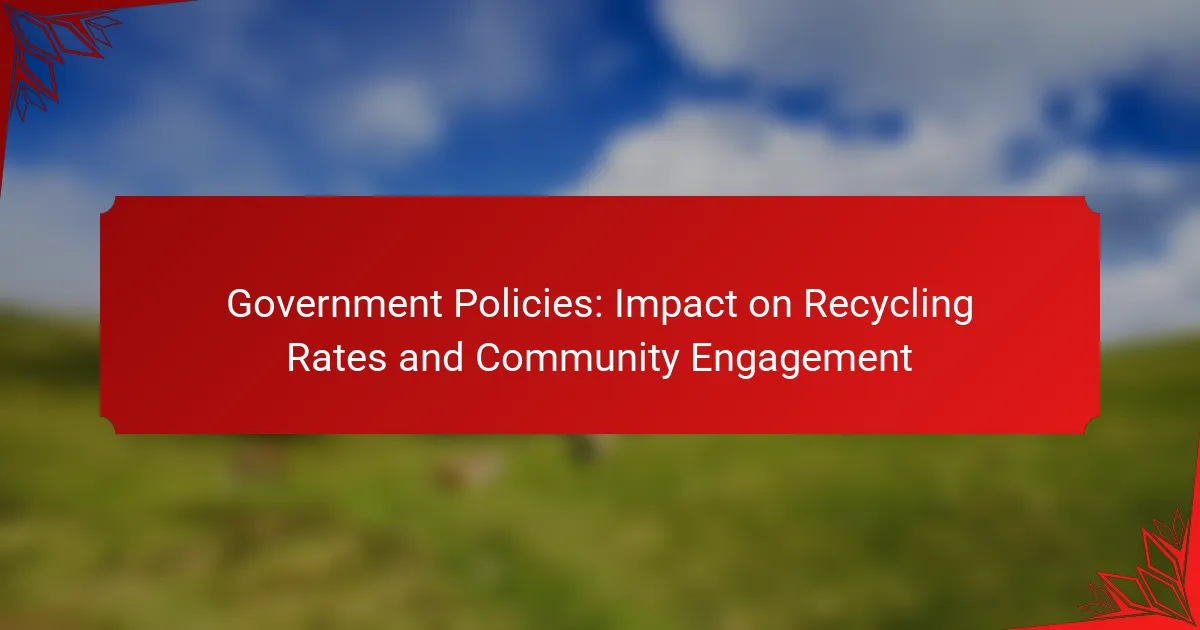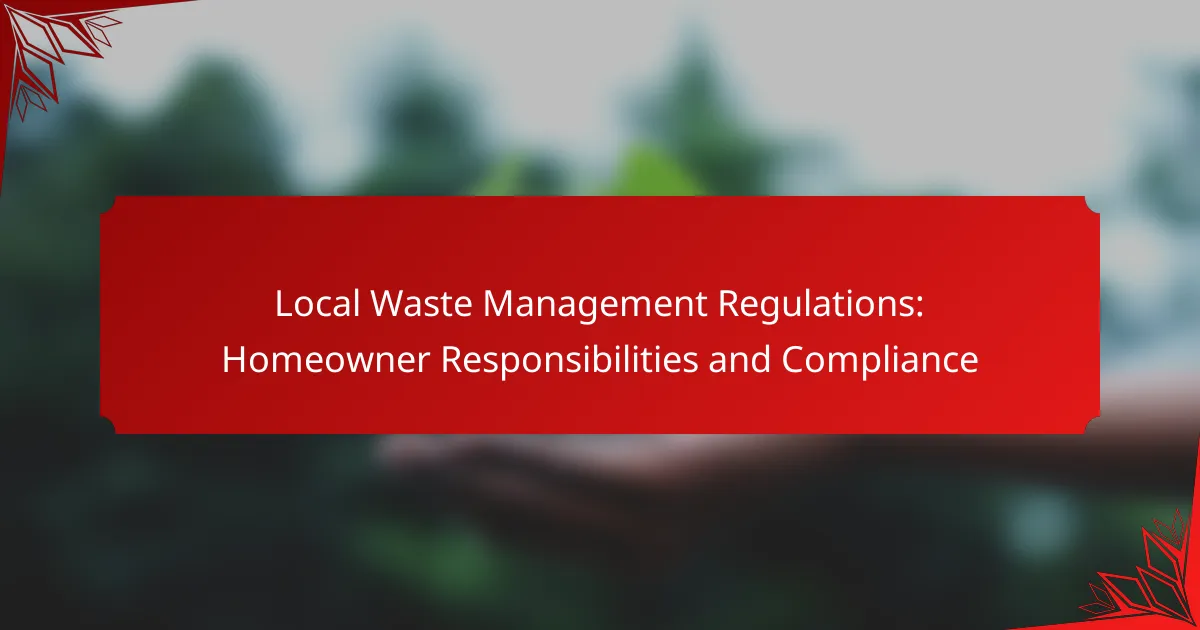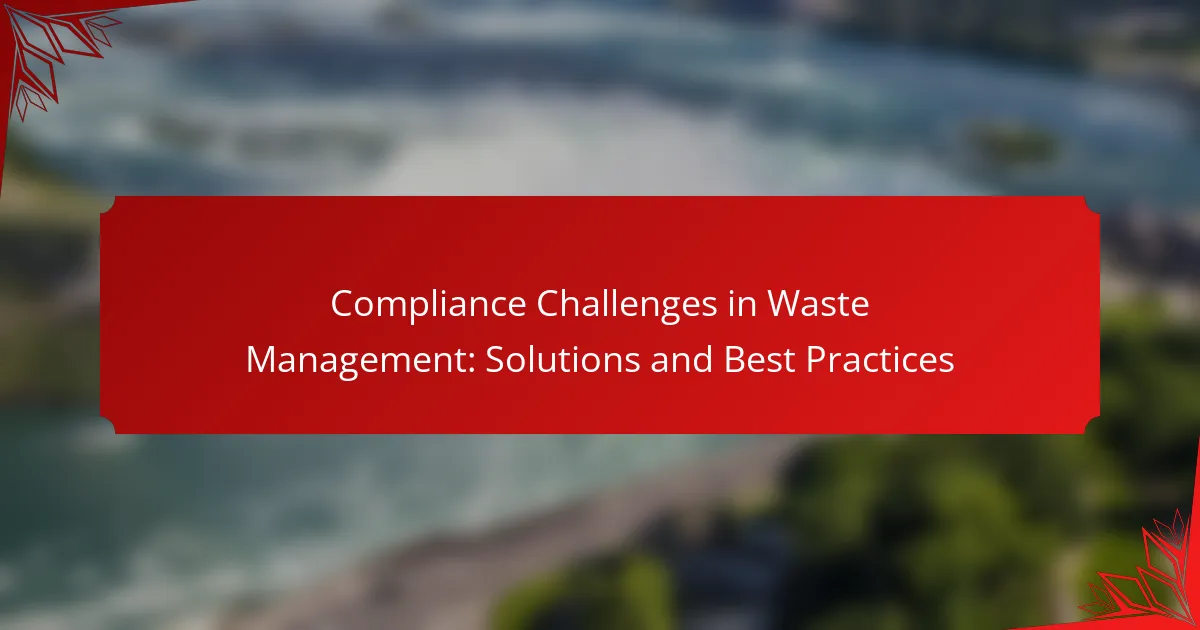The future of waste management legislation is poised for transformative change, driven by innovations aimed at sustainability and environmental responsibility. With a focus on accountability for producers and the integration of technology, upcoming regulations will reshape how cities approach waste reduction, recycling, and composting. These developments promise to engage various stakeholders, fostering a more circular economy and significantly reducing reliance on landfills.
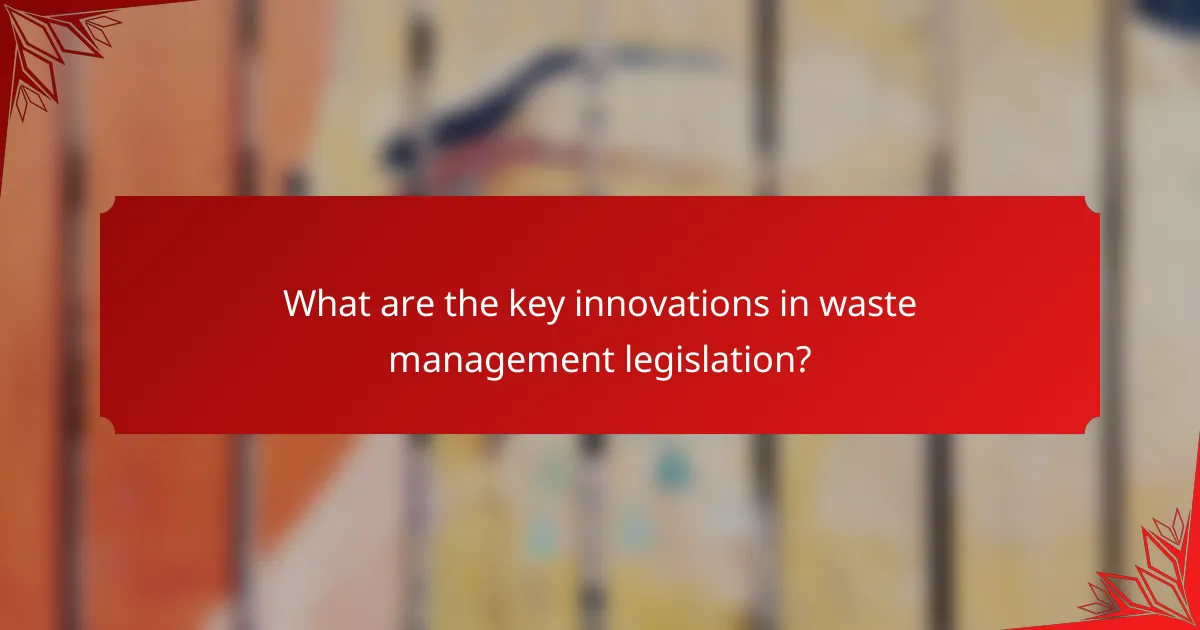
What are the key innovations in waste management legislation?
Key innovations in waste management legislation focus on enhancing sustainability and reducing environmental impact. These innovations include frameworks that hold producers accountable, promote waste reduction, and leverage technology for better tracking and management of waste.
Extended Producer Responsibility (EPR)
Extended Producer Responsibility (EPR) shifts the burden of waste management from taxpayers to producers. Under EPR, manufacturers are responsible for the entire lifecycle of their products, including post-consumer waste. This encourages companies to design products that are easier to recycle or dispose of sustainably.
Countries like Germany and Sweden have implemented EPR laws, resulting in higher recycling rates and reduced landfill use. Businesses must consider compliance costs and potential benefits from improved brand reputation and customer loyalty.
Zero Waste Initiatives
Zero Waste Initiatives aim to eliminate waste through comprehensive strategies that promote recycling and composting. These initiatives encourage communities to rethink waste generation and focus on resource recovery. By adopting a zero waste framework, municipalities can significantly reduce landfill contributions.
Examples include San Francisco’s goal to divert 100% of waste from landfills by 2030. Local governments should engage residents and businesses in education and outreach to foster participation and success in these programs.
Digital Waste Tracking Technologies
Digital waste tracking technologies utilize software and IoT devices to monitor waste generation and disposal in real-time. These technologies improve transparency and efficiency in waste management processes. By tracking waste, organizations can identify trends and areas for improvement.
For instance, apps that allow consumers to report waste disposal practices can help municipalities adjust their services. Companies should invest in these technologies to enhance operational efficiency and meet regulatory requirements.
Biodegradable Materials Regulations
Biodegradable materials regulations encourage the use of products that break down naturally, reducing the burden on landfills. Legislation often specifies standards for what qualifies as biodegradable, ensuring that materials decompose within a reasonable timeframe.
Countries such as Italy have enacted laws banning single-use plastics, promoting alternatives like biodegradable bags. Businesses should stay informed about these regulations to avoid penalties and align with consumer preferences for sustainable products.
Waste-to-Energy Policies
Waste-to-energy policies facilitate the conversion of waste materials into usable energy, such as electricity or heat. This approach reduces landfill waste while generating renewable energy, contributing to energy security and sustainability goals.
Countries like Sweden have successfully integrated waste-to-energy systems, with a significant portion of their waste being converted into energy. Stakeholders should evaluate the environmental impacts and economic feasibility of these systems to ensure they complement broader waste management strategies.
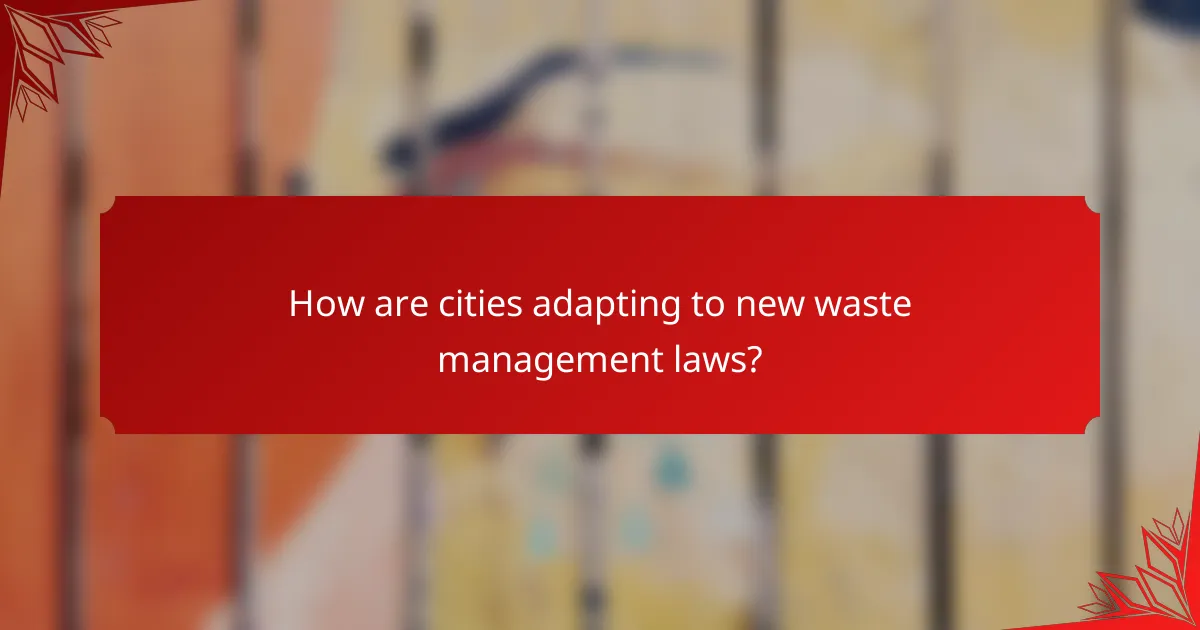
How are cities adapting to new waste management laws?
Cities are increasingly implementing innovative waste management laws to enhance sustainability and reduce landfill reliance. These adaptations often involve comprehensive plans that promote recycling, composting, and waste diversion strategies tailored to local needs.
Los Angeles’ Comprehensive Waste Diversion Plan
Los Angeles has developed a Comprehensive Waste Diversion Plan aimed at reducing waste sent to landfills by 90% by 2035. This plan includes strategies such as expanding recycling programs, increasing public awareness, and enhancing waste collection services.
Key components of the plan involve partnerships with local businesses and community organizations to encourage participation in recycling initiatives. Residents are provided with resources and education on proper waste sorting to maximize diversion rates.
New York City’s Organics Collection Program
New York City’s Organics Collection Program focuses on diverting organic waste from landfills through citywide composting initiatives. This program encourages residents and businesses to separate food scraps and yard waste for collection, which are then processed into compost.
The program has expanded significantly, with participation from both residential and commercial sectors. New York City aims to reduce organic waste by a substantial percentage, contributing to a more sustainable urban environment.
San Francisco’s Mandatory Recycling Ordinance
San Francisco’s Mandatory Recycling Ordinance requires all residents and businesses to separate recyclables and compostables from trash. This law is part of the city’s goal to achieve zero waste by 2030, making it one of the most ambitious waste management policies in the United States.
Enforcement of the ordinance includes fines for non-compliance, which encourages proper waste sorting. The city provides educational resources and accessible collection services to help residents meet these requirements effectively.
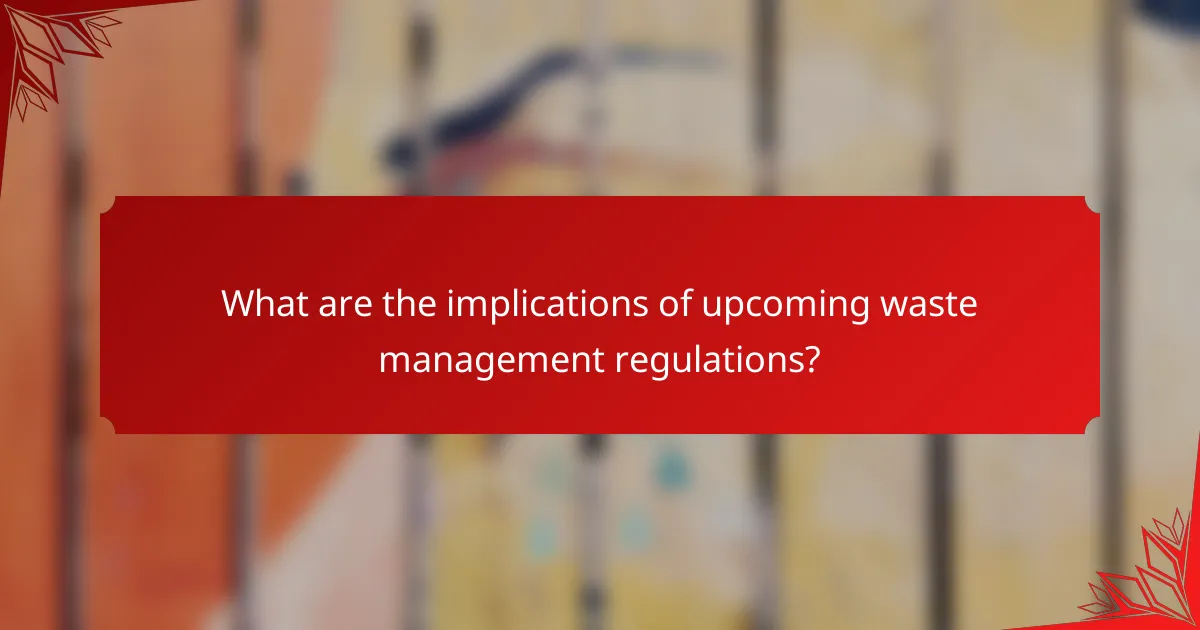
What are the implications of upcoming waste management regulations?
Upcoming waste management regulations are set to significantly impact various stakeholders, including businesses, local governments, and consumers. These regulations aim to promote sustainability, reduce landfill waste, and enhance recycling efforts, ultimately leading to a more circular economy.
Impact on Businesses and Manufacturers
Businesses and manufacturers will face stricter compliance requirements as new waste management regulations roll out. Companies may need to invest in advanced waste reduction technologies and adopt sustainable practices to meet these standards.
For instance, manufacturers might be required to implement take-back programs for their products, ensuring that materials are reused or recycled. This shift could lead to increased operational costs, but also open up new markets for recycled materials.
Effects on Local Governments
Local governments will bear the responsibility of enforcing new waste management regulations, which may require additional resources and staff training. They will need to develop new waste collection and recycling programs to comply with these regulations.
Moreover, municipalities could face budget constraints as they adapt to these changes. However, by improving waste management practices, local governments may ultimately reduce landfill costs and enhance community sustainability initiatives.
Changes in Consumer Behavior
As waste management regulations evolve, consumer behavior is likely to shift towards more sustainable practices. Increased awareness of environmental issues will encourage individuals to participate in recycling programs and support businesses that prioritize sustainability.
Consumers may also demand more transparency regarding product lifecycle and waste management practices from brands. This trend could lead to a greater emphasis on eco-friendly products, influencing purchasing decisions and fostering a culture of sustainability.

What criteria should businesses consider for compliance?
Businesses should focus on understanding local regulations, assessing financial impacts, and evaluating partnerships in waste management to ensure compliance. These criteria help organizations navigate the complexities of waste legislation effectively.
Understanding Local Legislation Variances
Local legislation on waste management can vary significantly between regions, impacting how businesses must operate. Companies should familiarize themselves with specific regulations in their area, such as recycling mandates, waste disposal limits, and reporting requirements.
For example, some cities may have strict recycling laws that require businesses to separate waste into multiple categories, while others may not enforce such measures. Staying informed about these variances can prevent costly fines and enhance sustainability efforts.
Assessing Financial Implications
Financial implications of waste management compliance can include costs associated with waste disposal, recycling programs, and potential penalties for non-compliance. Businesses should conduct a cost-benefit analysis to determine the most economical waste management strategies.
Investing in efficient waste management systems may incur upfront costs but can lead to long-term savings through reduced disposal fees and improved resource recovery. Companies should also consider potential tax incentives for sustainable practices, which can offset expenses.
Evaluating Waste Management Partnerships
Forming partnerships with waste management providers can enhance compliance and operational efficiency. Businesses should evaluate potential partners based on their track record, services offered, and understanding of local regulations.
Choosing the right partner can streamline waste disposal processes and ensure adherence to legal requirements. It’s beneficial to seek providers that offer comprehensive solutions, including recycling and waste reduction programs, to maximize compliance and sustainability efforts.
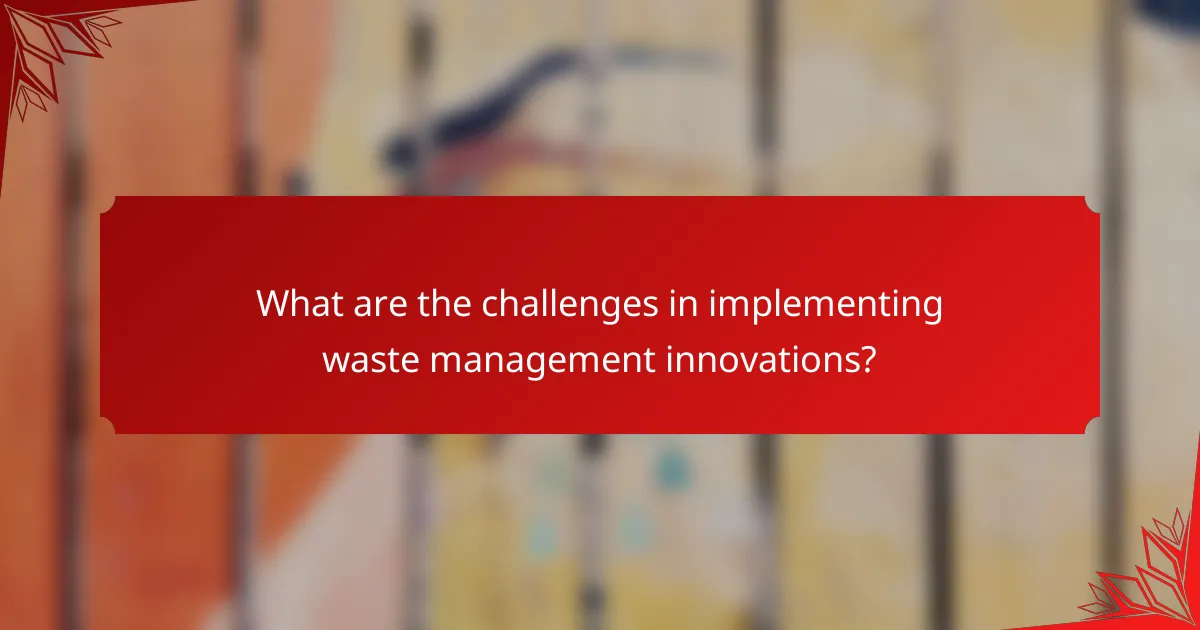
What are the challenges in implementing waste management innovations?
Implementing waste management innovations faces several challenges, including funding limitations, public engagement, and technological hurdles. Addressing these issues is crucial for the successful adoption of new waste management practices.
Funding and Resource Allocation
Securing adequate funding for waste management innovations is a significant challenge. Many municipalities operate on tight budgets, making it difficult to allocate resources for new technologies or programs. Prioritizing funding for waste management can lead to better long-term outcomes, but it often requires convincing stakeholders of its importance.
Innovative waste management solutions, such as recycling programs or waste-to-energy plants, may require initial investments that can be offset by long-term savings. Local governments should consider public-private partnerships as a way to share costs and resources effectively.
Public Awareness and Engagement
Public awareness and engagement are critical for the success of waste management innovations. Without community support, even the best technologies can fail. Educational campaigns that inform residents about the benefits of new waste management practices can foster participation and compliance.
Engaging the public through workshops, social media, and local events can enhance understanding and encourage proactive behavior. For example, cities that have implemented community recycling programs often see increased participation when residents are informed about the environmental benefits.
Technological Barriers
Technological barriers can impede the implementation of waste management innovations. Many local governments may lack the infrastructure or expertise to adopt advanced waste processing technologies. Assessing current capabilities and identifying gaps is essential for effective planning.
Investing in training for staff and collaborating with technology providers can help overcome these barriers. Additionally, pilot programs can serve as a testing ground for new technologies, allowing municipalities to evaluate their effectiveness before full-scale implementation.
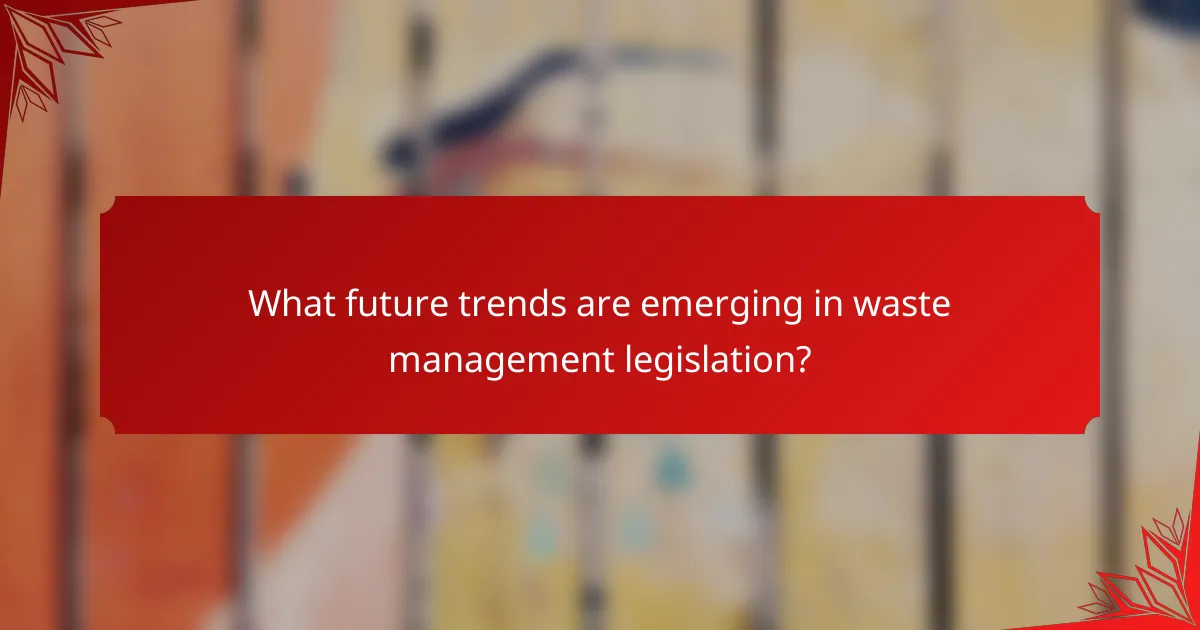
What future trends are emerging in waste management legislation?
Future trends in waste management legislation are increasingly focused on sustainability, circular economy principles, and stricter regulations on waste reduction. Governments are adopting innovative policies to promote recycling, minimize landfill use, and encourage the responsible disposal of hazardous materials.
Increased emphasis on circular economy principles
Circular economy principles aim to keep resources in use for as long as possible, reducing waste and promoting sustainability. Legislation is shifting towards requiring businesses to design products that are easier to recycle and reuse, ultimately minimizing environmental impact. For example, some countries are implementing extended producer responsibility (EPR) laws that hold manufacturers accountable for the entire lifecycle of their products.
Stricter regulations on single-use plastics
Many jurisdictions are enacting stricter regulations on single-use plastics to combat pollution and encourage sustainable alternatives. This includes bans or taxes on plastic bags, straws, and utensils, pushing consumers and businesses towards eco-friendly options. Countries like France and Canada have already implemented comprehensive bans, while the European Union is working towards similar goals.
Technological innovations in waste management
Advancements in technology are playing a crucial role in shaping waste management legislation. Innovations such as smart waste bins, AI-driven sorting systems, and waste-to-energy technologies are being integrated into regulatory frameworks. These technologies not only improve efficiency but also enhance tracking and reporting capabilities, allowing for better compliance with waste management laws.
Focus on hazardous waste and e-waste regulations
As electronic waste continues to rise, legislation is increasingly addressing the safe disposal and recycling of hazardous materials. New regulations are being introduced to ensure that e-waste is handled responsibly, with penalties for non-compliance. For instance, many regions now require businesses to register e-waste and follow specific disposal protocols to mitigate environmental risks.

